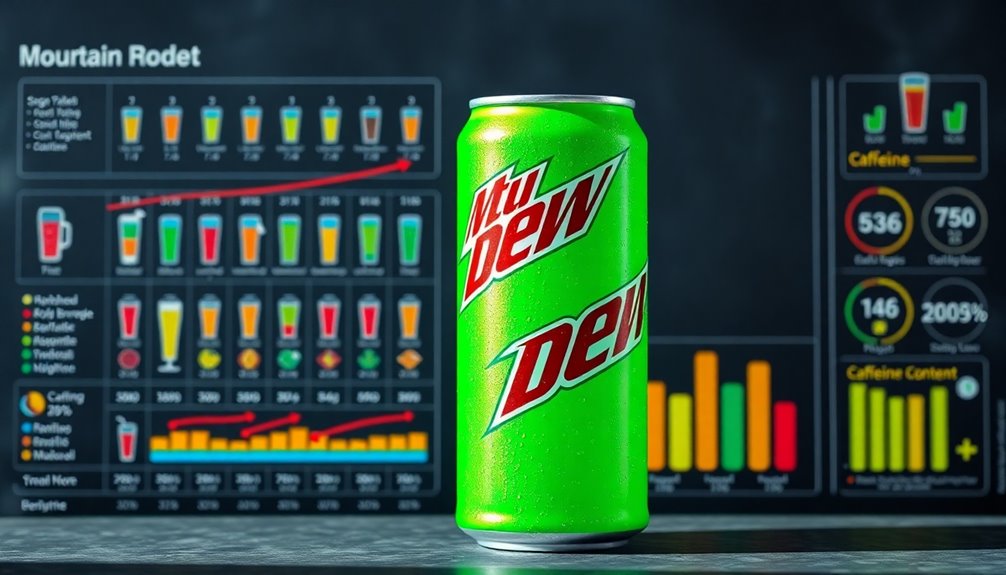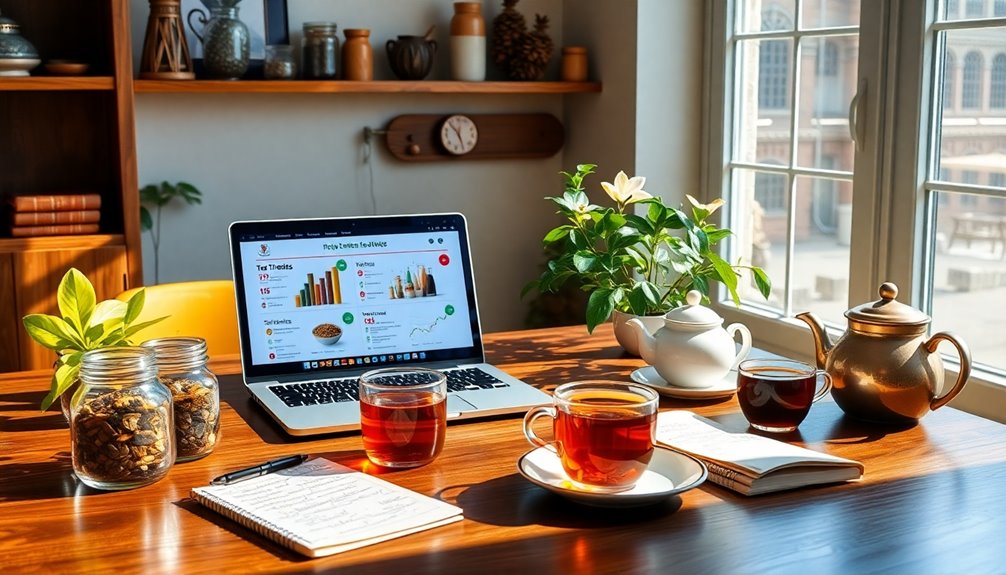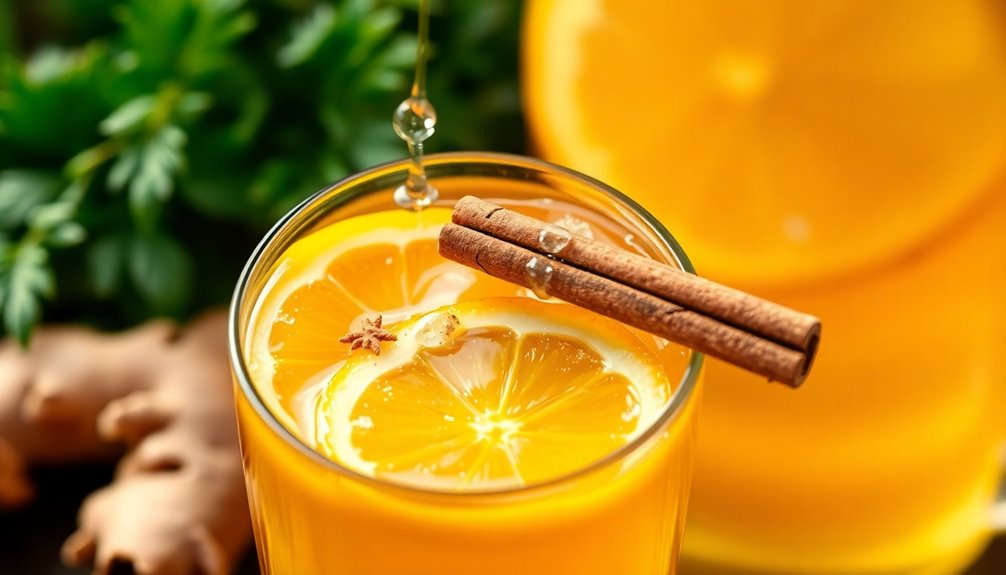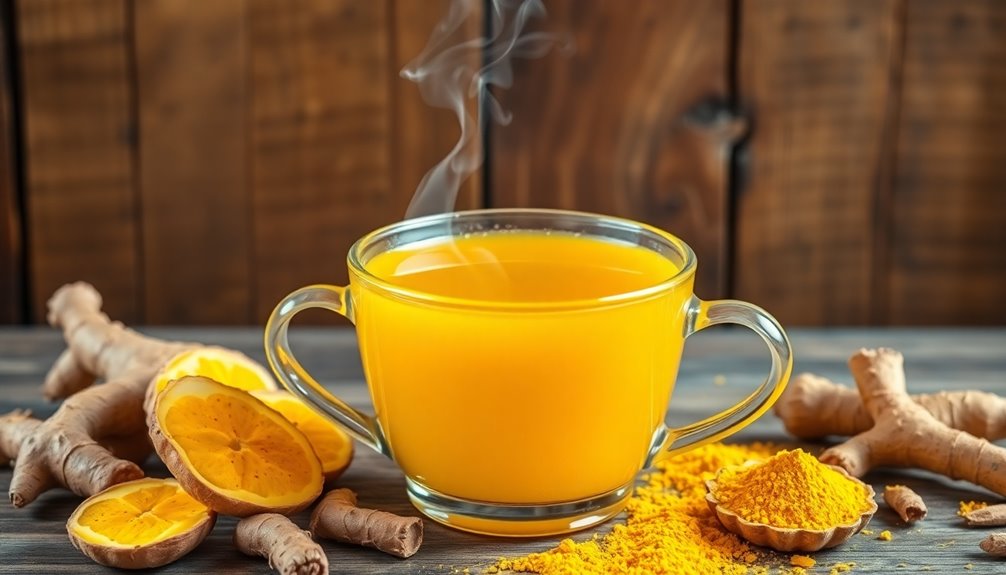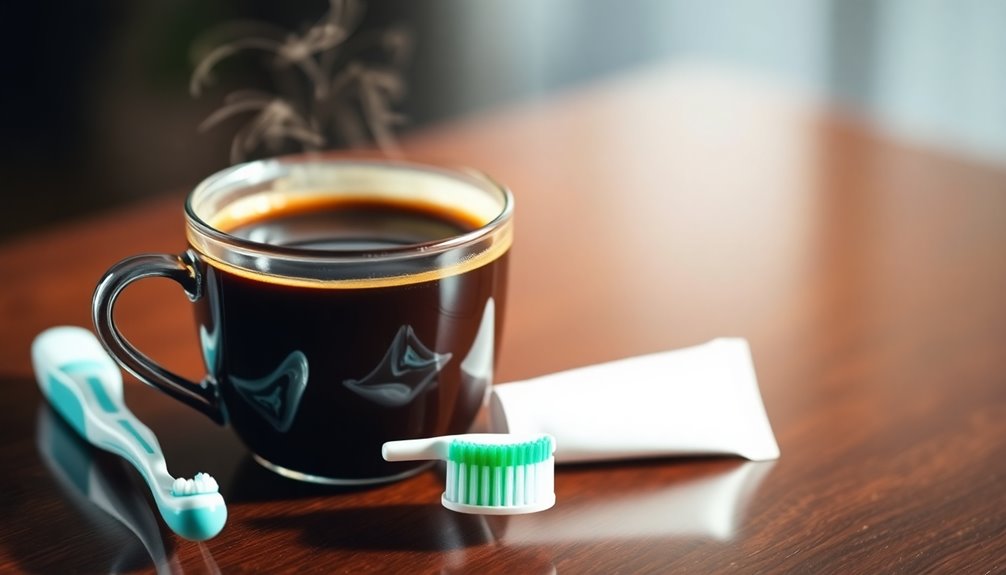Mountain Dew's caffeine content varies depending on the type. Regular Mountain Dew packs 55 mg of caffeine in a 12 oz can. For lighter options, Mountain Dew Zero Sugar offers just 5.7 mg in the same size. Want an energy boost? Mountain Dew Energy has a whopping 180 mg in a 16 oz can. Mountain Dew Amp contains 142 mg per 16 oz as well. If you're keeping tabs on your caffeine intake, you've got plenty of options. Curious about discontinued flavors or how Mountain Dew compares to other drinks? There's a lot more to discover!
Key Takeaways
- Regular Mountain Dew contains 55 mg of caffeine per 12 oz can, providing a moderate caffeine level among sodas.
- An 8 oz serving of Mountain Dew has approximately 37 mg of caffeine.
- Mountain Dew Amp delivers a higher caffeine content of 142 mg per 16 oz.
- Mountain Dew Energy contains up to 180 mg of caffeine in a 16 oz serving.
- Mountain Dew Zero Sugar offers a low caffeine option at 5.7 mg per 12 oz can.
Caffeine Levels in Mountain Dew

When you crack open a 12 oz can of Mountain Dew, you're getting a boost of 55 mg of caffeine. This caffeine in Mountain Dew gives you that quick energy lift you might need.
If you prefer an 8 oz serving, you'll find approximately 37 mg of caffeine, allowing for a lighter dose.
For those looking to avoid caffeine altogether, Caffeine-Free Diet Mountain Dew is a unique option.
Different flavors of Mountain Dew can vary greatly in caffeine content; for instance, Mountain Dew Amp packs a punch with up to 142 mg per 16 oz.
In contrast, Mountain Dew Zero Sugar contains just 5.7 mg of caffeine per 12 oz can, making it a lower-caffeine choice.
Comparison With Other Beverages

When you compare Mountain Dew to other beverages, its caffeine content stands out.
While a 12 oz can of Mountain Dew packs 55 mg of caffeine, an 8 oz cup of coffee can have up to 100 mg.
In contrast, energy drinks like Monster can skyrocket to 160 mg, highlighting the range of options you have when seeking a caffeine boost. Furthermore, the caffeine content in Monster energy drinks can vary depending on the specific product, with some containing as much as 240 mg per serving. This caffeine level is much higher than that found in a typical cup of coffee, making it important to carefully consider your caffeine intake when consuming energy drinks. It’s always a good idea to read the labels and know the caffeine content before indulging in these types of beverages.
Caffeine Levels Overview
While many people enjoy a variety of beverages throughout the day, it's important to understand how their caffeine content compares.
A 12 oz can of regular Mountain Dew contains 55 mg of caffeine, placing it in the moderate range among sodas. In contrast, an 8 oz cup of coffee typically packs 80-100 mg of caffeine, considerably outpacing Mountain Dew.
Many sodas, like Coca-Cola, have even lower caffeine levels, with around 35 mg per 12 oz serving.
If you're considering energy drinks, be mindful that they often exceed Mountain Dew's caffeine content, with some brands like Monster Energy boasting up to 160 mg per serving.
For those avoiding caffeine, Caffeine-Free Diet Mountain Dew offers a zero-caffeine alternative.
Mountain Dew vs. Coffee
Understanding the caffeine content in Mountain Dew brings up an interesting comparison with coffee, one of the most popular beverages worldwide.
When considering your caffeine intake, here's how they stack up:
- A 12 oz can of Mountain Dew contains 55 mg of caffeine.
- An average 8 oz cup of coffee typically has 80-100 mg of caffeine.
- Mountain Dew sits between sodas like Coca-Cola (35 mg) and coffee.
While Mountain Dew offers a moderate caffeine boost compared to other soft drinks, it still lags behind coffee.
If you're looking for a stronger kick, coffee might be your better bet.
Just remember, caffeine levels vary across different flavors and brands, so always check the label for specifics!
Comparisons With Energy Drinks
Energy drinks have gained immense popularity for their potent caffeine content, often appealing to those seeking a quick boost.
Mountain Dew contains approximately 54 mg of caffeine per 12 oz can, positioning it in the moderate range compared to energy drinks.
For instance, a typical Monster energy drink can pack a staggering 160 mg of caffeine, far surpassing Mountain Dew's levels.
Similarly, Red Bull offers about 80 mg of caffeine in its 8.4 oz can, which is still higher than what you'll find in Mountain Dew.
On the softer side, beverages like Coca-Cola average around 35 mg per 12 oz can, making Mountain Dew a stronger choice among sodas without reaching the extreme highs of energy drinks.
Health Risks of Caffeine
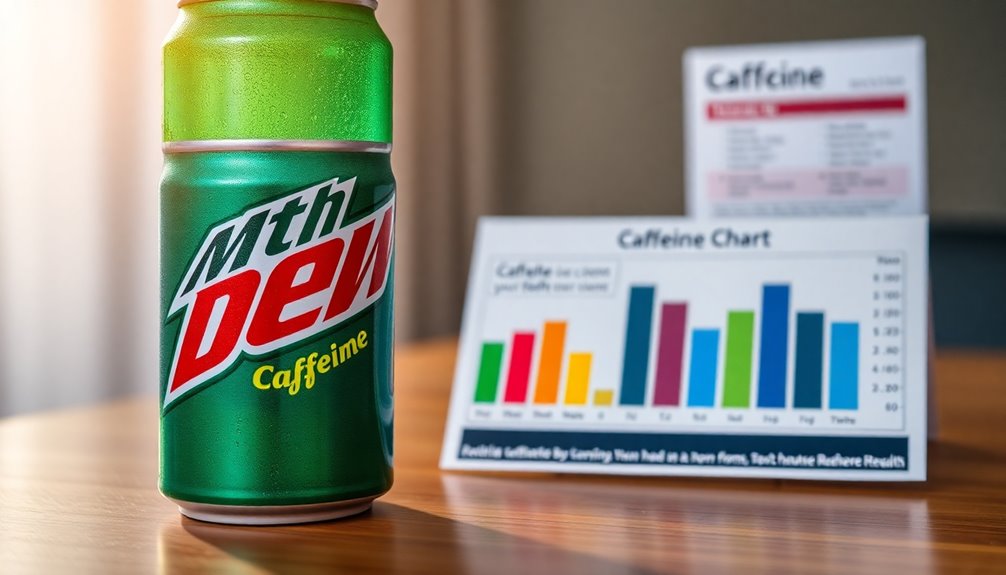
Caffeine may seem harmless in moderation, but exceeding 400 mg daily can lead to a range of health risks. You might experience:
- Insomnia and anxiety
- Increased heart rate and upset stomach
- Dependence, causing withdrawal symptoms
High-caffeine brews, like Mountain Dew, contribute to these issues.
If you're pregnant, it's best to limit your intake to under 200 mg per day to reduce the risk of miscarriage and birth defects.
Long-term overconsumption can lead to severe health problems, so staying informed is key.
Keep up with the latest caffeine news to better understand how much caffeine you're consuming and its potential effects.
Monitoring your daily intake can help you enjoy your favorite drinks without the negative side effects.
Mountain Dew Variations
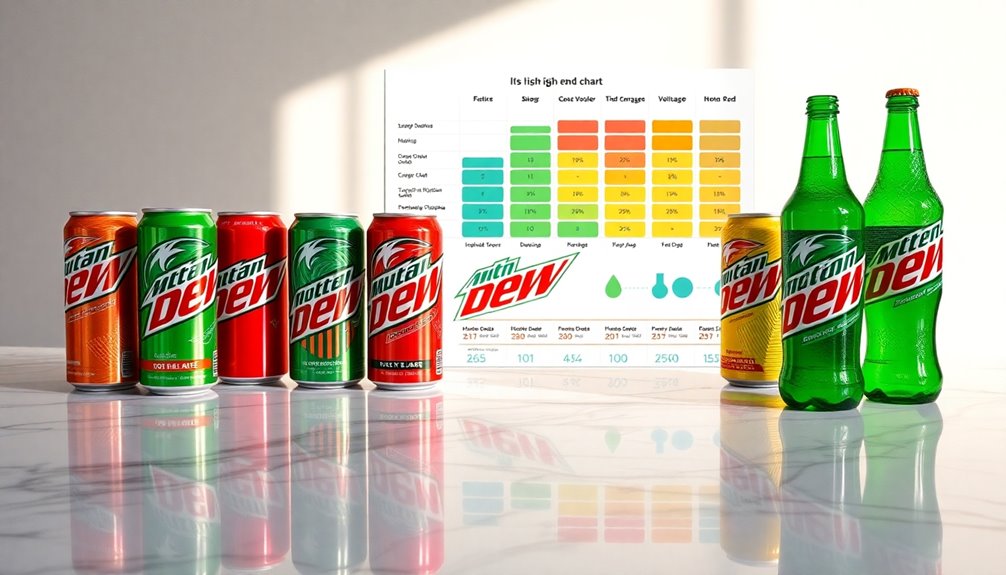
While being mindful of your caffeine intake, you might find it interesting to explore the various Mountain Dew options available. Each variation offers a different caffeine level, catering to diverse preferences.
| Mountain Dew Variation | Caffeine Content (mg) |
|---|---|
| Regular Mountain Dew | 55 |
| Mountain Dew Energy | 180 |
| Mountain Dew Amp | 142 |
| Mountain Dew Kickstart | ~60 |
| Mountain Dew Zero Sugar | 5.7 |
From the moderate caffeine of regular Mountain Dew to the high-energy boost of Mountain Dew Energy, you've got choices. Whether you prefer a low-caffeine option or a more energizing drink, there's a variation to suit your needs!
Discontinued Mountain Dew Flavors
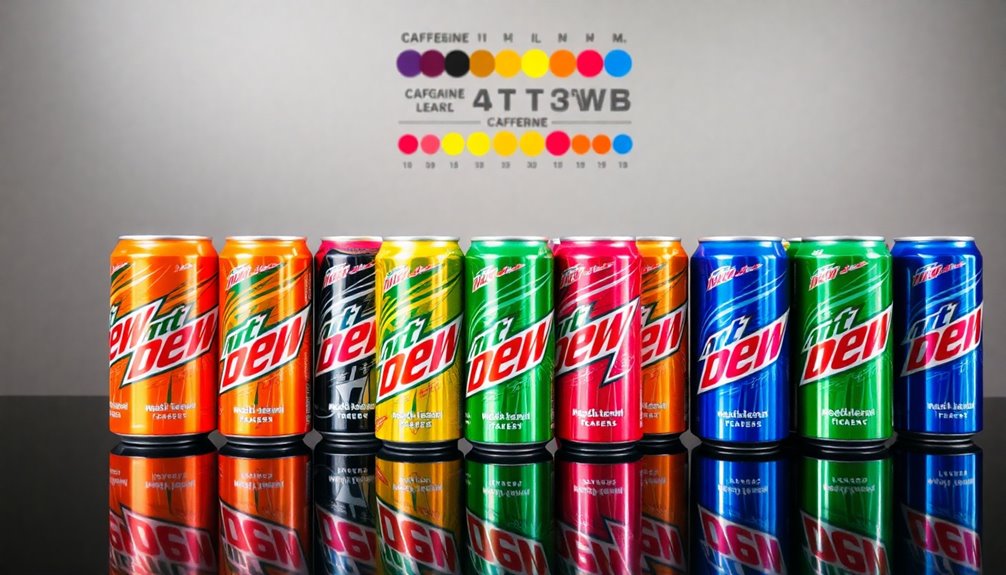
You probably remember some of the discontinued Mountain Dew flavors that left a mark on your taste buds.
Each unique formula brought its own caffeine kick and flavor profile, creating nostalgic memories for fans.
Let's explore those flavors that have come and gone, and what made them special.
Nostalgic Flavor Experiences
For many fans, the thrill of discovering a new Mountain Dew flavor is tied to the nostalgia of past favorites, especially those that have since been discontinued.
These flavors not only offered a unique taste but also packed in much caffeine, making them memorable.
- Mountain Dew Black Label: 83 mg caffeine in 16 fl oz
- Mountain Dew Kickstart Hydrating Boost: 68 mg caffeine in 12 fl oz
- Mountain Dew Ultra Violet: 54 mg caffeine in 12 fl oz
Each sip brings back fond memories of vibrant colors and energy boosts.
The innovative approach to flavor experimentation reflects a time when Mountain Dew pushed boundaries, creating a lasting impression in the beverage world that many fans cherish today.
Unique Caffeine Variations
The excitement surrounding Mountain Dew's unique flavors isn't just about nostalgia; it's also about the varying caffeine levels that these discontinued options offered.
For instance, Mountain Dew Black Label packed a punch with 83 mg of caffeine in a 16 fl oz serving, making it a favorite for those needing a serious boost.
Then there was Mountain Dew Kickstart Hydrating Boost, providing 68 mg of caffeine in a 12 fl oz size, perfect for a morning pick-me-up.
Mountain Dew Spiked delivered 72 mg of caffeine in a 16 fl oz can, while Ultra Violet offered a lighter option with 54 mg in a 12 fl oz serving.
These flavors showcased the diverse caffeine experience Mountain Dew fans enjoyed before they vanished.
Where to Buy Mountain Dew
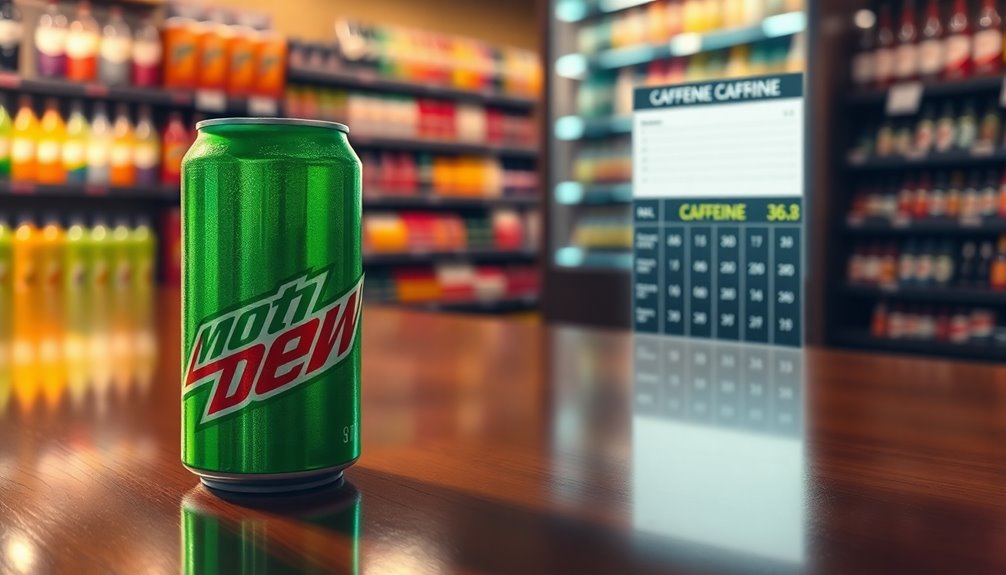
Wondering where to grab your favorite Mountain Dew? You've got plenty of options!
Whether you're looking for a quick refreshment or stocking up for a party, here's where you can find it:
- Amazon: Check out the Mountain Dew Mini Cans (7.5 fl oz, Pack of 10) for $5.98 or grab the Game Fuel Variety Pack (12 fl oz, Pack of 18) for $15.98.
- Local Grocery Stores: Most grocery stores carry a variety of Mountain Dew products, perfect for immediate cravings.
- Convenience Shops: Quick stops at convenience stores often yield a selection of Mountain Dew, so you won't have to go far.
Caffeine Content Overview
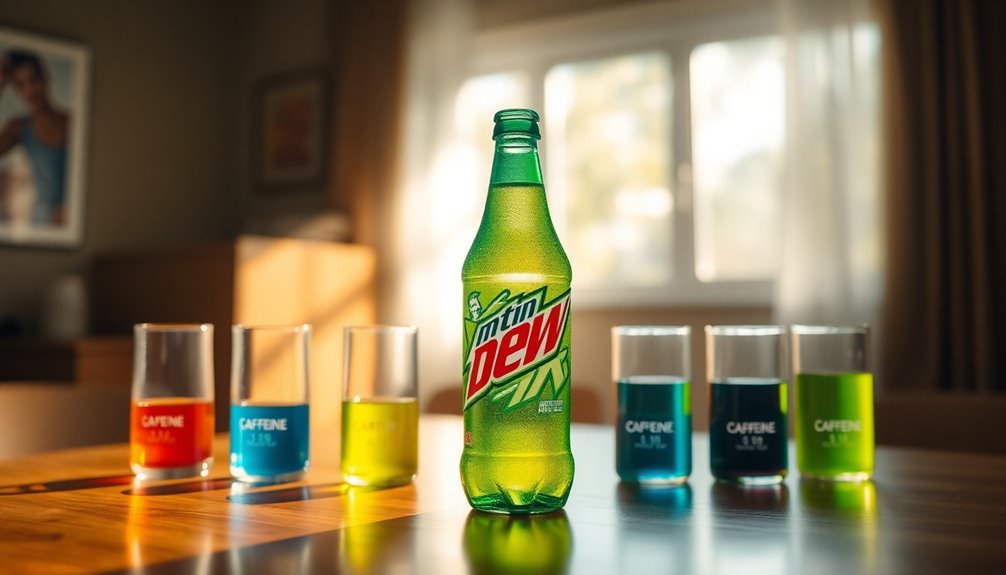
If you're curious about how much caffeine is in Mountain Dew, you'll find it offers a range of options to suit different preferences.
The regular Mountain Dew (12 oz) packs about 55 mg of caffeine, making it a moderate choice among sodas. If you opt for an 8 oz serving, you'll get around 37 mg, which can vary by flavor.
For those wanting to skip caffeine, Caffeine-Free Diet Mountain Dew is a great choice.
On the other hand, the latest brews like Mountain Dew Energy (16 fl oz) boast a hefty 180 mg of caffeine, while Mountain Dew Amp (16 fl oz) contains 142 mg.
Compared to other beverages, Mountain Dew's caffeine content sits comfortably between typical sodas and energy drinks.
Health Considerations
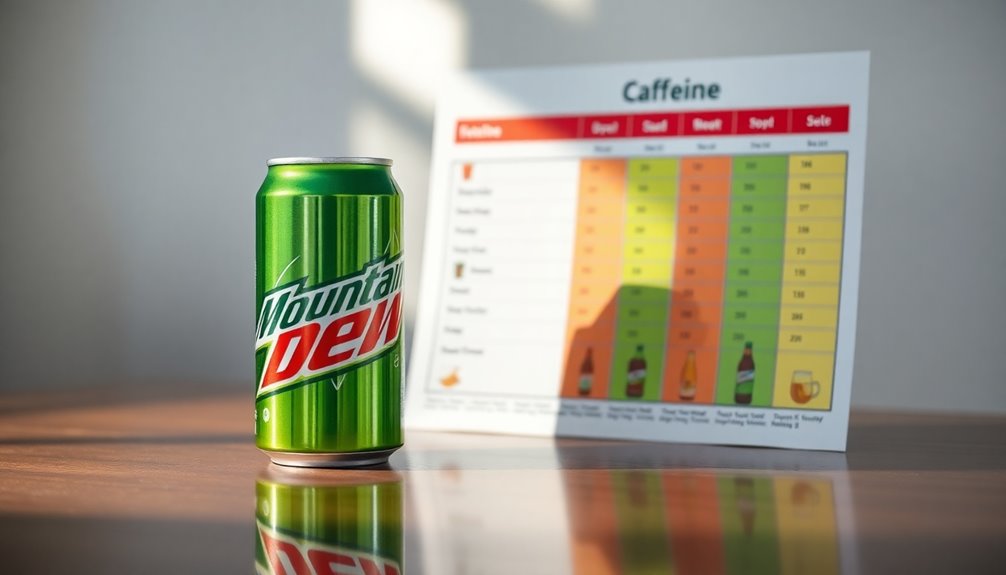
While enjoying Mountain Dew can be invigorating, it's important to take into account the potential health implications associated with its consumption. Here are a few key considerations:
- Mountain Dew contains 46 grams of sugar, exceeding the American Heart Association's daily recommendations.
- Regular intake may increase the risk of obesity and diabetes.
- Pregnant women should monitor their caffeine intake, as it's advised to stay under 200 mg daily.
Although adults can safely consume Mountain Dew in moderation, the high sugar content and caffeine can lead to health issues.
The combination of caffeine and sugar may also exacerbate dehydration, especially when mixed with alcohol. Being aware of these risks can help you make informed choices about your beverage consumption. Additionally, understanding financial considerations for elderly care can be important for those managing health-related expenses.
Understanding Caffeine Safety
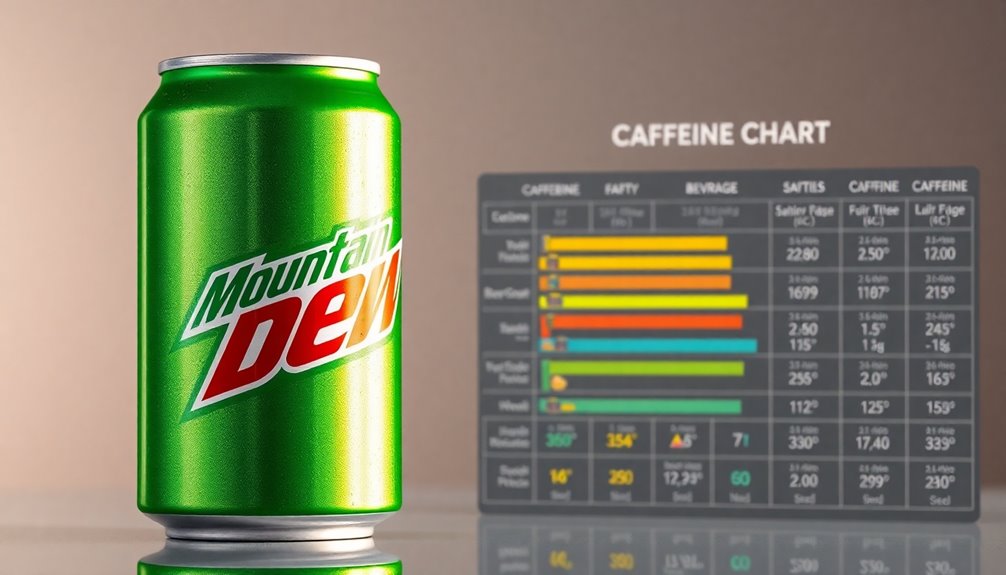
Understanding caffeine safety is essential, especially when enjoying popular beverages like Mountain Dew.
The FDA suggests that most adults can safely consume up to 400 mg of caffeine daily without adverse effects. However, if you consume too much, you might experience insomnia, anxiety, or an increased heart rate.
If you're pregnant, it's best to limit your intake to under 200 mg of caffeine per day to minimize risks. Remember, everyone's tolerance varies, so pay attention to how your body reacts.
Long-term overconsumption can lead to dependence and withdrawal symptoms, making moderation key. By understanding your personal caffeine limits, you can enjoy beverages like Mountain Dew while maintaining your overall well-being and sleep health.
Frequently Asked Questions
What Has More Caffeine, Coffee or Mountain Dew?
When you compare coffee and Mountain Dew, coffee's got more caffeine.
An average 8 oz cup of coffee packs around 80-100 mg of caffeine, while that same serving of Mountain Dew only has about 37 mg.
So, if you're looking for a stronger kick, coffee's your best bet.
Mountain Dew does have a moderate caffeine level among sodas, but it just can't compete with the caffeine boost coffee offers.
Which Soda Has the Most Caffeine?
Imagine a race between the boldest sprinters in a soda marathon. In this contest, energy drinks like Monster take the lead, boasting up to 160 mg of caffeine.
But when it comes to traditional sodas, Mountain Dew claims a solid position with 55 mg, outpacing others like Coca-Cola and Dr Pepper.
If you're searching for the most caffeinated soda, reach for the energy drinks; they'll surely give you the boost you're craving.
How Much Caffeine Is in a 20 Oz Mountain Dew?
A 20 oz Mountain Dew packs about 110 mg of caffeine, making it a solid choice if you're looking for a caffeine boost.
This amount is higher than what you'd find in a standard 12 oz can, which has around 55 mg.
So, if you're craving something with a bit of energy, grabbing a 20 oz bottle will give you a noticeable lift without going overboard like some energy drinks.
Enjoy it wisely!
What Drink Has the Highest Caffeine?
When it comes to caffeine kick, energy drinks like Bang are the heavyweights, packing a punch with up to 300 mg per 16 oz serving.
They're like a lightning bolt in a can! Monster Energy drinks can also hit similar highs, while Starbucks brewed coffee offers a more grounded option at around 80-100 mg per 8 oz.
If you're seeking the ultimate boost, those energy drinks are your best bet!
Conclusion
In the vibrant world of beverages, Mountain Dew stands out with its unique caffeine kick, keeping you energized for adventures. Yet, while it offers a zesty thrill, it's crucial to balance that excitement with awareness of caffeine's potential risks. So, whether you're reaching for a rejuvenating can or contemplating healthier choices, remember that moderation is key. Enjoy the buzz, but don't forget to listen to your body—finding that sweet spot makes all the difference.
